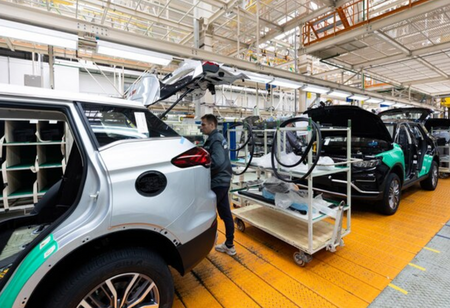
BYD, a Chinese EV manufacturer is on track to overtake Tesla Inc. as the new global leader in completely electric vehicle sales. When it does, which is expected in the current quarter, it will be a symbolic turning point for the EV market as well as another evidence of China's growing weight in the global automotive sector.
In a market still dominated by household names like Toyota Motor Corp., Volkswagen AG, and General Motors Co., Chinese manufacturers such as BYD and SAIC Motor Corp. are making significant gains. China now competes with Japan for the global lead in passenger automobile exports, having surpassed the United States, South Korea, and Germany in recent years. As of October of this year, 1.3 million of the 3.6 million automobiles shipped from the mainland were electric.
"The competitive landscape of the auto industry has changed," said Bridget McCarthy, head of China operations for Snow Bull Capital, a Shenzhen-based hedge fund that has invested in both BYD and Tesla. "It's no longer about automakers' size and legacy; it's about how quickly they can innovate and iterate." BYD began preparing for this long before in order to be able to achieve it faster than anyone thought feasible, and now the rest of the industry must scramble to catch up."
The shift in competitive dynamics between Tesla's Elon Musk, the world's richest executive, and BYD's billionaire founder Wang Chuanfu is also reflected in the passing of the EV sales crown.
Whereas Musk has warned that with such high financing rates, not enough buyers will be able to afford his EVs, Wang is going on the offensive. His company sells a half-dozen higher-volume variants for far less than Tesla's cheapest Model 3 sedan in China.
When a Tesla owners' club uploaded a video of Musk snickering at BYD's automobiles during a 2011 interview on Bloomberg Television in May, Musk responded by writing that BYD's vehicles are "highly competitive these days."
The expected shift in the global EV pecking order represents the achievement of a goal set by Wang, 57, when China was just beginning to cultivate its now world-beating electric car industry. While BYD attempts to distance itself from Tesla and other automakers at home, reproducing its overwhelming success abroad is proving difficult.
Europe appears prepared to join the United States in placing hefty tariffs on Chinese auto imports in order to protect thousands of manufacturing jobs. Other countries' electric vehicle markets are still in their infancy and aren't nearly as profitable. Due to the increasing trade tensions between Washington and Beijing, management considers the United States to be virtually off-limits.
Wang is not Elon Musk; he avoids social media and avoids the spotlight. However, in an unusually bold speech made just weeks before the European Union launched an inquiry into how China has subsidised its EV industry, Wang declared that the moment had come for Chinese brands to "demolish the old legends" of the auto world.
While many automobile customers outside of China are still unfamiliar with BYD, Warren Buffett isn't. Berkshire Hathaway Inc. invested approximately $230 million for a nearly 10% investment in the Chinese manufacturer in 2008. When Berkshire began reducing its interest last year, BYD shares were near an all-time high, and the value of their stock had risen roughly 35-fold to around $8 billion.
BYD was primarily viewed as a battery play by the late Berkshire Vice Chairman Charlie Munger. In May 2009, he stated on Bloomberg TV that the company was working on "one of the most important subjects affecting the technological future of man." Munger's family had invested in the company years before Berkshire, and he told an interviewer weeks before his death in November that he had tried to discourage Wang from entering the auto industry.
BYD purchased a struggling state-owned carmaker in 2003 and debuted its first plug-in hybrid, the F3DM, in 2008. The exterior design of the compact was blasted by a New York Times reviewer, who described it as "about as trendy as a Y2K-era Toyota Corolla." In the first year, the company sold all 48 units.
Around the same time, China began subsidizing the purchase of plug-in hybrid vehicles. Government assistance ranged from towns and provinces to the national level, and included tax discounts for consumers, production incentives for manufacturers, assistance with research and development, and cheap land and financing.
BYD was well positioned to benefit as a rare automaker that also produced its own batteries. Prior to joining the automobile industry, it was the first Chinese supplier of lithium-ion batteries to Motorola and Nokia in the early 2000s. To increase output before consumers embraced EVs, the business targeted automobile categories that would require a large number of cells. Its first electric bus debuted shortly after the F3DM.

